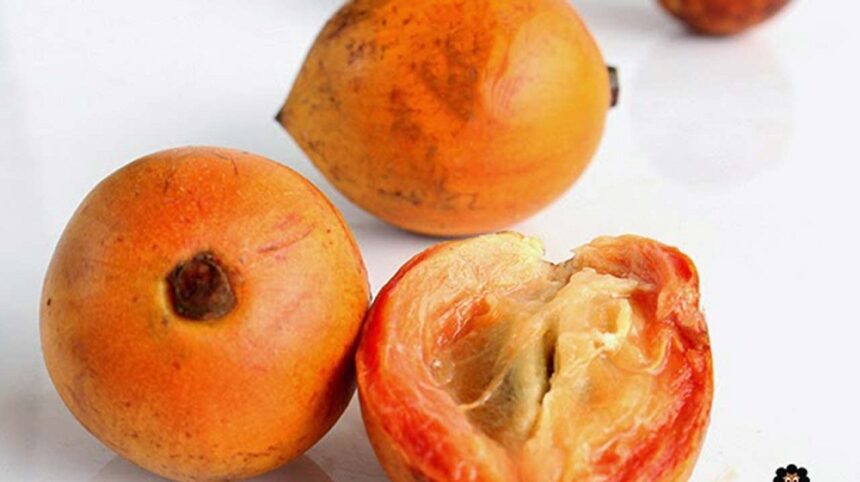
Many dismiss the African star apple, often known as cherry, as a fruit for children as most of them love it. However, to prevent malaria, everyone should enjoy the fruit, which is currently in season.
Botanically called Chrysophyllum albidum, African star apple is an edible tropical fruit known by various tribal names. It is called Utieagadava in Urhobo, Agbalumo in Yoruba, Udala in Ibo, Efik and Ibibio, and Ehya in Igala and Agwaluma in Hausa tribes of Nigeria.
Even when there is malaria, consuming it while on malaria treatment with Artemisinin-Based Combination Therapies (ACTs), the commonly prescribed malaria medicine, can help boost its effectiveness in treating the disease.
In a new study, researchers found that African star apple has the potential to increase the antimalarial property of artemether-lumefantrine and can play a crucial role in enhancing the effectiveness of these drugs in ridding the body of the parasite that causes malaria.
Artemisinin-lumefantrine is a widely recommended ACT for malaria treatment. It combines the rapid action of artemisinin with the longer-acting lumefantrine, providing effective malaria parasite clearance and preventing its recurrence. However, challenges such as resistance have necessitated the exploration of adjunct therapies.
The study, published in the International Journal of Science and Research Archive, involved Ebubechukwu Favour Chibzoom-Pius, Chibueze Peter Ihekwereme, Adanna Perpetua Ikebudu and Amara Naomi Ulasi.
It was designed to investigate the possible enhancement of the antimalarial potency, as well as possible herb-drug interaction resulting from individuals taking artemether-lumefantrine and African star apple during the same period.
Read Also: EFCC arrests 37 suspected internet fraudsters in Kwara
The researchers involved 40 mice infected with Plasmodium berghei, divided into groups receiving different doses of extract of African star apple pulp alongside artemether-lumefantrine and measuring the resulting malaria parasite levels to assess their antimalarial activity.
They were treated with 250 mg/kg, 500 mg/kg and 1000 mg/kg of the extract in combination with 20 mg/120 mg of artemether-lumefantrine. Thereafter, the malaria parasite level in the animals was determined by counting how many there were in red blood cells under the microscope to assess antimalarial activity.
The researchers found significant malaria parasite suppression (88.81%, 94.58%, and 100%) at doses of 250, 500, and 1000 mg/kg of the extract, indicating a clear relationship between dosage and effectiveness.
Also, there was a 56.05% increase in systemic exposure (AUC) of artemether-lumefantrine when administered with Chrysophyllum albidum, suggesting an interaction that enhances the drug’s efficacy.
Several parts of the tree, including its roots and leaves, are used for medicinal purposes. The leaves are frequently used to treat malaria, blood pressure, anaemia, dermatological infections, diarrhoea and stomach ache.
The roots are used in the treatment of sterility, sexual asthenia, and asthma, while its seeds are mostly used to treat intestinal worms and haemorrhoids. The bark is used against cough, yellow fever and also malaria, while the fruit is used for the treatment of dental decay.
In many African cultures, the African star apple is prepared as a decoction or infusion and administered alongside conventional antimalarial medications. This traditional practice suggests that the local population has observed a positive effect of the African star apple on malaria treatment.
Previously, Dr Chibzoom-Pius and his co-researchers reported that the consumption of African star apple in pregnancy should be encouraged to protect from malaria.
The researchers in 2017 said African star apple possesses both suppressive and curative properties for malaria and thus could be valuable in pregnancy, where it may possibly serve as an intermittent preventive therapy against malaria.
In the study documented by the journal Ancient Science of Life, researchers evaluated the suppressive and curative antimalarial properties of extracts made from pulp juice and seed of African star apple in albino mice inoculated with Plasmodium berghei.
In comparison, Artesunate produced an average percentage reduction of 93.24 per cent on day four and 98.64 per cent on day seven, similar to that of 1000 mg/kg of C. albidum seed extract. Artesunate (positive control) recorded 86.48 per cent suppression.
There were no statistical differences between the percentage suppressions of Artesunate and the seed or pulp extracts, suggesting that the plant material was as effective as the control.
The researchers declared: “The sampled plant parts can be used for treatment and prevention of malaria in both pregnant and non-pregnant individuals. Traditional consumption of the pulp by pregnant women does not suggest any harm to the mothers or their babies.
“This may be advantageous since such food could work in synergy with already acquired immunity to mitigate the infection. Furthermore, it would occupy a unique position in the public health structure of such a community, as disease-causing organisms may not easily develop resistance to whole herbal extracts.”
Malaria still constitutes a major public health menace, especially in tropical and subtropical countries. Close to half a million people, mainly children in Africa, die every year from the disease. With the rising resistance to frontline drugs (artemisinin-based combinations), there is a need to accelerate the discovery and development of newer anti-malarial drugs.
WATCH TOP VIDEOS FROM NIGERIAN TRIBUNE TV
- Let’s Talk About SELF-AWARENESS
- Is Your Confidence Mistaken for Pride? Let’s talk about it
- Is Etiquette About Perfection…Or Just Not Being Rude?
- Top Psychologist Reveal 3 Signs You’re Struggling With Imposter Syndrome
- Do You Pick Up Work-Related Calls at Midnight or Never? Let’s Talk About Boundaries






